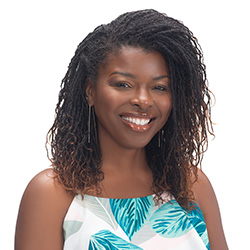USA Swimming News
Thursday, February 16, 2023
Black History Month Moments: Trish Miller

by USA Swimming
 Trish Miller, founder of SwemSchool in Atlanta, Georgia, took time to reflect on her journey through the sport.
Trish Miller, founder of SwemSchool in Atlanta, Georgia, took time to reflect on her journey through the sport.What does “Swem” mean?
“Swem is ‘swim’ in Afrikaans. We’re very intentional on this word. It really stems from my own experience in the water. I didn’t come to this work as a competitive swimmer. I actually didn’t know how to swim and my background is in public health. When I was a teenager, I grew up near the oceanfront in Virginia. We would never go near the water, didn’t have any family that had pools, but I was a part of this program in elementary school where they would transport students during the school day for swimming instruction.
“We got two weeks of swimming lessons and in my school, I was often the only Black child. Not just the only Black girl – the only Black child, and my swimming instructor couldn’t understand why I was afraid of the water. I had never seen a pool that big or been in water like that. I had no idea what to do so she really didn’t know how to connect with me. It’s funny how you remember bits and pieces of things when you’re young. I just remember holding onto the side of the pool and she said, ‘You just hang out over here and I’ll deal with these other kids.’ I reflected on that experience over the years.“
How did you develop a relationship with water?
“My mom is close to 80 and I’ve never even seen her in a bathing suit. She grew up through Jim Crowe, colorism, staying out of the sun and all this stuff that shaped her. Pools weren’t available to her or my father at that time so her world view and decision for me was to keep me out of the water. She didn’t know how to swim, and she had a lot of fear around it; she just kept me out of it.
“When I was a teenager and just out of college and you tell people you can’t swim, my friends were like ‘Oh, we can teach you.’ It was on a girls’ trip. I could do some stuff underwater, I thought I could kind of swim and they taught me a few things and hyped me up. I didn’t know what I didn’t know then at 19 years old. I jumped into 12 feet of water, came up, and went back down. I didn’t know how to tread water. Thankfully, my friends were on deck, and I was going to scream for help because I was struggling. They jumped in and got me out.
“That experience stayed with me a long time, through my own children. I got them into swim lessons at an early age but I still didn’t get in the water. They continued to progress and I didn’t like that I couldn’t get to them if something had happened. I really needed to learn. I started swim lessons, and it wasn’t clicking for me. I got frustrated. It wasn’t until someone introduced me to a relationship to the water. It’s a connection with the water that I missed.
“As an adult, it’s not necessarily about skill – moving your arms and legs – it’s mental for adults on how to swim. You first have to appeal to the intellect. We’re used to controlling things. The instructor I had introduced me to the spirituality and connection to the space. Once I figured out how to honor the space, and the offering I needed to give to the space – how to surrender to the water – that made all the difference for me. I celebrated my first lap in 2019. That work, that journey, guided SwemKids.”
Related Articles
ARTICLE
Applications Open for the 2026 National Diversity Select Camp
Jan 22, 2026
ARTICLE
Four Additional Interactive Coaching Mini Courses Added to USA Swimming University
Jan 22, 2026
ARTICLE
2024-25 Scholastic All-America Team Announced
Dec 12, 2025
ARTICLE
Three Additional Interactive Coaching Mini Courses Added to USA Swimming University
Nov 20, 2025
ARTICLE
USA Swimming Elects Brent Lang as Board Chair to Serve Through 2029
Nov 4, 2025
ARTICLE
USA Swimming Recognizes 2025-26 Club Excellence Recipients
Oct 24, 2025
ARTICLE
USA Swimming Board Chair Natalie Coughlin to Step Down
Oct 23, 2025
ARTICLE
National Select Camp Attendees Head to Olympic Training Center
Oct 8, 2025
ARTICLE
USA Swimming Elects Andrew Seliskar as Athlete Representative to the Board of Directors
Sep 30, 2025
